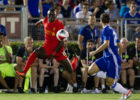Liverpool were excellent against Leeds United yesterday afternoon. During his interview after the match, Marcelo Bielsa stated that Liverpool were ‘superior to us in all aspects of the game’. Quite a statement from a manager that knows his onions. The Reds took the game to the home side, earning the right to play and quietening the crowd in the opening stages before putting their foot down after that. The red card, which I’ll come to in more detail shortly, might give some people the impression that it swayed the outcome of the match. It did not. The Reds were the better team from the off and, generally speaking, held Leeds at arms length from the moment the game got underway. We were worthy winners that once again demonstrated the fact that the ruling out of us in any title conversations by the pundit class before a ball was kicked this season was idiotic at best.
The moment @MoSalah became the fifth-fastest player to reach 100 @PremierLeague goals 👏#LEELIV pic.twitter.com/xtYbA5OJeM
— Liverpool FC (@LFC) September 12, 2021
In a similar sense, there are still swathes of Liverpool supporters that somehow manage to underplay what Mohamed Salah has achieved in the club’s colours. As Manchester United fans fawn over the return of Cristiano Ronaldo, happily ignoring the rape allegations made against him in the process, it’s worth bearing in mind that Salah has outperformed him in terms of sheer numbers. He is a phenomenal footballer that we’re lucky to be able to watch week-in, week-out. On the other side, it was good to see Sadio Mané’s game get back on track, even if he struggled to find his scoring boots for the majority of the match. If he can take confidence from the goal that he scored at Elland Road then the two of them could easily fire us to more silverware at the end of this campaign. The only blight on the performance was the injury to Harvey Elliott, which is, sadly, the natural conclusion of the FA’s idiotic approach to refereeing.
Letting The Game Flow Shouldn’t Mean Ignoring Fouls
I’ve got no problem with the desire of some to ‘let the game flow’; at least not in theory. We all want football to be faster-paced and more interesting to watch, of that there can be little doubt. I do wonder, though, whether there’s an extent to which the Football Association, the Premier League and the PGMOL have picked on the wrong issues. When Liverpool played Burnley at Anfield, for example, the ball was in play for less than 45 minutes in total, yet there were zero yellow cards issued for time-wasting. Referees seem to have taken the desire to ‘let the game flow’ as a signal that they can ignore clear fouls, especially when they’re committed by the ‘smaller’ teams on the bigger ones. Not stopping play for every little incident that occurs is all well and good, but if it means that harder and harder challenges are going to be committed then things will only end one way.
Klopp to the BBC: “I couldn’t care less (if it was a red card). It’s not my business. It is a serious injury, definitely for an 18-year-old boy. The red card is not important. Two or three weeks he can play on, Harvey will not.” #LFC
— James Pearce (@JamesPearceLFC) September 12, 2021
For the record, I think that Pascal Struijk was a touch unlucky to be shown a red card. The referee initially waved the challenge away and only seemed to choose to send the player off when the extent of the injury became clear. Whilst I understand the criticism of some Liverpool fans, pointing out that he was off the floor and out of control, it wasn’t a ‘dirty’ tackle in and of itself. Even so, the new remit to ‘let the game flow’ means that referees are actively turning a blind eye to fouls that are just fouls. Struijk should have already been on a yellow card for a challenge earlier in the match, which would have meant that he would have been less likely to dive in on the challenge that looks to have ruled Harvey Elliott out for some time. Instead, he felt as though he could not only make the challenge but that he probably wouldn’t be punished for it even if he did foul the player.
It Gives Referees Licence To Be Even Worse
Let’s be honest, there are very few people out there that think that Premier League referees are good at what they do. Under Mike Riley’s leadership, the PGMOL appears to have gone backwards, which is quite impressive when you consider that they were pretty poor in the first place. Refereeing is a difficult job, few people would argue with that assertion. Yet the men in the middle of English top-flight matches seem to make life harder for themselves at every turn. It was clear that they didn’t want to embrace the Video Assistant Referee and so, rather than use it to improve their officiating, they seemed to use it in the worst possible way after its introduction to the game. Now the ability to ‘let the game flow’ means that referees can officiate circumstance, rather than just apply the rules of the game correctly and in the manner that they’re supposed to.
Them challenges always happen when you let a few go and ‘let the game flow’.
It’s on the ref, they’d tried to rough Elliott up a few times cos he’s a kid. Needed nipping in the bud. Shite. Twats. #LFC
— Graeme Kelly (@GraemeKelly1) September 12, 2021
Some referees seem to think that their job is to level up a match when one team is clearly better than another. We saw it during the Liverpool match against Burnley, when some of Sean Dyche’s players quite literally picked up and threw Liverpool players to the ground, only for Mike Dean to completely ignore such things. The Match Of The Day crew then had a good laugh at Jürgen Klopp complaining about it later that night, referring to it as ‘mind games’. Few people who watch Premier League football on a regular basis would argue against the idea that some referees have a dislike of certain teams and a love of others, meaning that the new directive to ‘let the game flow’ will see them given carte blanche to wave away the protests of some teams and give others a foul every time a player hits the deck. The natural conclusion of all this is that Harvey Elliott is unlikely to be the last player to suffer a season-ending injury.



